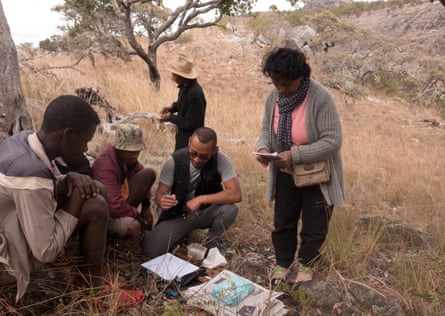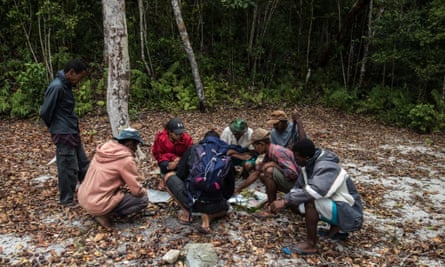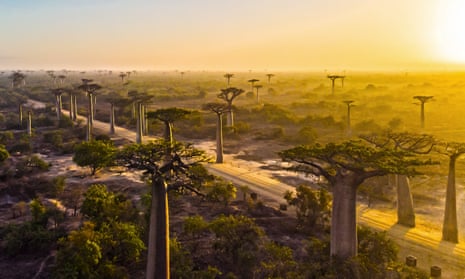Madagascar has lost nearly a quarter of its forest cover since 2001. Slash-and-burn agriculture, illegal logging and charcoal production have resulted in the large-scale clearing of ecosystems formed during the 88m years since the island separated from India.
Nearly all lemur species are now threatened with extinction, as is much of Madagascar’s biodiversity. Forest conservation and the development of sustainable sources of timber and charcoal, while reforesting large areas, are key challenges this century, especially for the millions of Malagasies whose livelihoods depend on them. As the planet heats, seed-banking threatened plant species has become an urgent task.
“Communities which live nearby depend on the forest for their survival. They find food, medicine, construction wood and water. The forest provides vital services like water catchment, pollution control, erosion protection and climate regulation,” says Vonona Randrianasolo, a researcher at Kew’s Madagascar conservation centre, who travels around Madagascar to collect seeds from threatened plant species. “Saving seeds is the best way to save many species from extinction. My actions are for future generations. I feel proud.”

The samples collected by Randrianasolo are vital for reforesting areas of the country with disappearing native species that will be more resilient in a changing climate, conserved in Kew’s Millennium Seed Bank and at the Silo National des Graines Forestières (SNGF) in Madagascar. Rainforest stretches down the island’s east coast, while dry tropical forest is found on the west, with scattered patches of montane humid forest found in the central highlands. All areas contain unique biodiversity, much of which is understudied or not known to science.
“All the work thus far in seed biology, tree planting and forestry has been about commercial species so we’re really having to play catch up,” says Tim Pearce, who oversees the African programme of the Millennium Seed Bank, an underground collection of more than 2.4bn seeds overseen by Kew. “When Vonona goes out and makes a collection of seeds from a tree we have never seen, we first have to understand how to look after it. That has all been done for a very narrow range of commercial species. For pretty well all wild species, we are well behind the curve.”

Many reforestation schemes around the world use fast-growing monocultures instead of native species, and Madagascar is no exception. In a country famous for its towering baobabs, eucalyptus and pine trees are becoming an increasingly common sight. The fast-growing species are important sources of fuel and timber for many Malagasies but can damage native biodiversity, threatening national parks such as Andasibe-Mantadia, where the rainforest is home to the biggest lemur in the world, the indri. Led by Madagascar’s own seed bank, the country is increasingly trying to reforest with native species, such as those collected in Kew seed-banking exercises.
“Pines are a big problem in Madagascar because they are very invasive. In the Itremo Massif protected area we manage in the high plateau, there are plantations on the border that are invading the natural forest,” says Hélène Ralimanana, the team manager at the Kew Madagascar conservation centre. “Eucalyptus plantations changes the soil condition. The areas around the trees become dry because they suck up the water.”

For Ralimanana, the seed-banking work is about more than conservation and protecting Madagascar’s forest. Many of the eucalyptus and pine plantations were planted by French colonisers, a practice continued by the Malagasy government until a recent policy change. Documenting the country’s biodiversity and ensuring tree nurseries can grow native trees for reforestation projects will help undo some of the damage from the past.
“Many native species are slow growing. But it is believed that there is big damage from plantations in the French colonial period,” she adds.
RBG Kew is one of four charities supported by the Guardian and Observer 2021 climate justice charity appeal, which is aimed at helping communities at the sharp end of the climate crisis. The others are Global Greengrants Fund UK, Environmental Justice Foundation, and Practical Action.
Through RBG Kew’s work in Madagascar, a team of mainly Malagasy botanists, researchers and conservationists is working to document and preserve the country’s biodiversity, which will be crucial to improving resilience in a changing climate.
Money from Guardian and Observer readers could help expand community plant nurseries of collected and stored seeds, while also supporting a range of projects to revegetate land and make it productive, such as those already carried out in Madagascar’s seasonal forests.
“We need to put the native species back – that’s where they grow and do well, and how they maintain their environment. If you put something else in, over time, it can destroy the ecosystem,” says Jenny Williams, a senior spatial analyst at Kew who has overseen projects in Madagascar to restore fire-damaged forest areas with native plant species and prevent deforestation.
“These are the species that are designed to be in the ecosystem. If they are there, they can look after it.”
